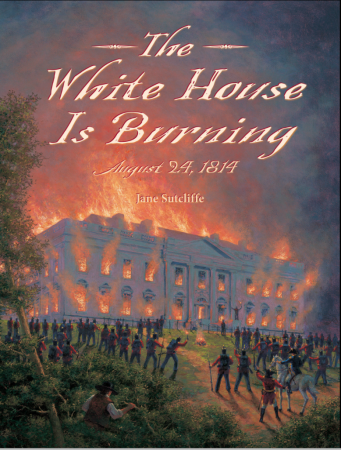 Today on the blog, please welcome my special guest: kidlit writer-friend, Jane Sutcliffe. Jane and I met through the New England chapter of SCBWI, and she is the author of over two dozen nonfiction books for kids, including the fantastic, recent picture book Stone Giant: Michelangelo’s David and How He Came to Be (Charlesbridge). Her new book, The White House is Burning August 24, 1814, is slated for publication next week (August 5, 2014). Jane lives on a farm in Tolland, Connecticut, with her husband, two sons, three goats, and “one very spoiled dog named Willy.”
Today on the blog, please welcome my special guest: kidlit writer-friend, Jane Sutcliffe. Jane and I met through the New England chapter of SCBWI, and she is the author of over two dozen nonfiction books for kids, including the fantastic, recent picture book Stone Giant: Michelangelo’s David and How He Came to Be (Charlesbridge). Her new book, The White House is Burning August 24, 1814, is slated for publication next week (August 5, 2014). Jane lives on a farm in Tolland, Connecticut, with her husband, two sons, three goats, and “one very spoiled dog named Willy.”
Here’s the trailer for the book.
So without further ado—here’s Jane!

Jane Sutcliffe
Paying Attention to the Voices
As a writer of nonfiction, especially history, I often tell people that my job is to listen to voices.
Yeah, I should probably explain that.
I’ve written a fair number of biographies, so I tend to see history from a very personal viewpoint. History for me is like a chorus, each voice telling its own unique story. You’ve got your loud bass voices, the ones belonging to the big names of history. And then there are the smaller, fainter ones. They have their own story to tell.
Those are the voices that fascinated me when I was researching my middle grade book, The White House is Burning: August 24, 1814. They’re the voices of slaves, clerks, and teenage soldiers. They’re the voices of people who were there. They watched the unthinkable happen: enemy troops invading Washington, burning the Capitol and the White House. They watched, up close and in person, as flames lit up the sky brighter even than the moon. I can only imagine what that night must have been like. How could I not listen to their stories?
There was the woman who wrote, “Few thought of going to bed—they spent the night in gazing on the fires.”
A little girl in Baltimore, forty-five miles away, saw the flames and marveled that, “I thought the world must be on fire—such a flame I have never seen since”
I listened to the anguish in the voice of the clerk who could not tear himself from the sight of the city in flames. “So awful,” he called the scene.
I listened to the teenage tourist known only as Miss Brown, who described in horror “the horizon illuminated by the burning Capitol.”
These are real people who experienced that night with real noses pressed against real windows. And they have a story to tell. Listen!